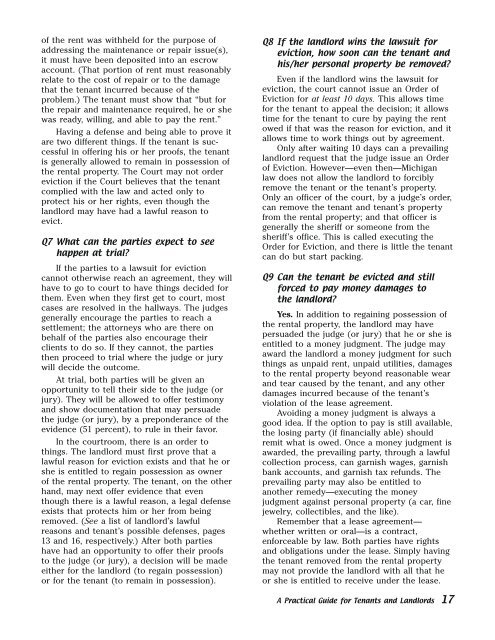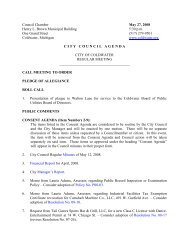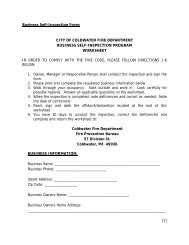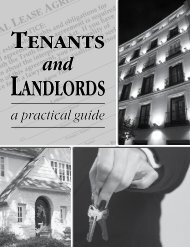Landlord Tenant Guide - State of Michigan
Landlord Tenant Guide - State of Michigan
Landlord Tenant Guide - State of Michigan
- No tags were found...
You also want an ePaper? Increase the reach of your titles
YUMPU automatically turns print PDFs into web optimized ePapers that Google loves.
<strong>of</strong> the rent was withheld for the purpose <strong>of</strong>addressing the maintenance or repair issue(s),it must have been deposited into an escrowaccount. (That portion <strong>of</strong> rent must reasonablyrelate to the cost <strong>of</strong> repair or to the damagethat the tenant incurred because <strong>of</strong> theproblem.) The tenant must show that “but forthe repair and maintenance required, he or shewas ready, willing, and able to pay the rent.”Having a defense and being able to prove itare two different things. If the tenant is successfulin <strong>of</strong>fering his or her pro<strong>of</strong>s, the tenantis generally allowed to remain in possession <strong>of</strong>the rental property. The Court may not ordereviction if the Court believes that the tenantcomplied with the law and acted only toprotect his or her rights, even though thelandlord may have had a lawful reason toevict. If the parties to a lawsuit for evictioncannot otherwise reach an agreement, they willhave to go to court to have things decided forthem. Even when they first get to court, mostcases are resolved in the hallways. The judgesgenerally encourage the parties to reach asettlement; the attorneys who are there onbehalf <strong>of</strong> the parties also encourage theirclients to do so. If they cannot, the partiesthen proceed to trial where the judge or jurywill decide the outcome.At trial, both parties will be given anopportunity to tell their side to the judge (orjury). They will be allowed to <strong>of</strong>fer testimonyand show documentation that may persuadethe judge (or jury), by a preponderance <strong>of</strong> theevidence (51 percent), to rule in their favor.In the courtroom, there is an order tothings. The landlord must first prove that alawful reason for eviction exists and that he orshe is entitled to regain possession as owner<strong>of</strong> the rental property. The tenant, on the otherhand, may next <strong>of</strong>fer evidence that eventhough there is a lawful reason, a legal defenseexists that protects him or her from beingremoved. (See a list <strong>of</strong> landlord’s lawfulreasons and tenant’s possible defenses, pages13 and 16, respectively.) After both partieshave had an opportunity to <strong>of</strong>fer their pro<strong>of</strong>sto the judge (or jury), a decision will be madeeither for the landlord (to regain possession)or for the tenant (to remain in possession). Even if the landlord wins the lawsuit foreviction, the court cannot issue an Order <strong>of</strong>Eviction for at least 10 days. This allows timefor the tenant to appeal the decision; it allowstime for the tenant to cure by paying the rentowed if that was the reason for eviction, and itallows time to work things out by agreement.Only after waiting 10 days can a prevailinglandlord request that the judge issue an Order<strong>of</strong> Eviction. However—even then—<strong>Michigan</strong>law does not allow the landlord to forciblyremove the tenant or the tenant’s property.Only an <strong>of</strong>ficer <strong>of</strong> the court, by a judge’s order,can remove the tenant and tenant’s propertyfrom the rental property; and that <strong>of</strong>ficer isgenerally the sheriff or someone from thesheriff’s <strong>of</strong>fice. This is called executing theOrder for Eviction, and there is little the tenantcan do but start packing. Yes. In addition to regaining possession <strong>of</strong>the rental property, the landlord may havepersuaded the judge (or jury) that he or she isentitled to a money judgment. The judge mayaward the landlord a money judgment for suchthings as unpaid rent, unpaid utilities, damagesto the rental property beyond reasonable wearand tear caused by the tenant, and any otherdamages incurred because <strong>of</strong> the tenant’sviolation <strong>of</strong> the lease agreement.Avoiding a money judgment is always agood idea. If the option to pay is still available,the losing party (if financially able) shouldremit what is owed. Once a money judgment isawarded, the prevailing party, through a lawfulcollection process, can garnish wages, garnishbank accounts, and garnish tax refunds. Theprevailing party may also be entitled toanother remedy—executing the moneyjudgment against personal property (a car, finejewelry, collectibles, and the like).Remember that a lease agreement—whether written or oral—is a contract,enforceable by law. Both parties have rightsand obligations under the lease. Simply havingthe tenant removed from the rental propertymay not provide the landlord with all that heor she is entitled to receive under the lease.





